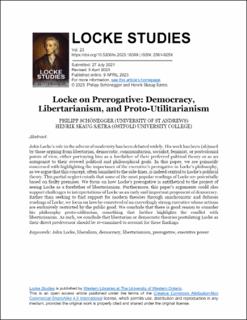| dc.contributor.author | Schönegger, Philipp | |
| dc.contributor.author | Sætra, Henrik Skaug | |
| dc.date.accessioned | 2023-10-17T07:09:43Z | |
| dc.date.available | 2023-10-17T07:09:43Z | |
| dc.date.created | 2023-08-09T18:37:06Z | |
| dc.date.issued | 2023 | |
| dc.identifier.citation | Locke Studies. 2023, 23, 1-26. | en_US |
| dc.identifier.issn | 1476-0290 | |
| dc.identifier.uri | https://hdl.handle.net/11250/3096844 | |
| dc.description.abstract | John Locke’s role in the advent of modernity has been debated widely. His work has been (ab)used by those arguing from libertarian, democratic, communitarian, socialist, feminist, or postcolonial points of view, either portraying him as a forefather of their preferred political theory or as an antagonist to their avowed political and philosophical goals. In this paper, we are primarily concerned with highlighting the importance of the executive’s prerogative in Locke’s philosophy, as we argue that this concept, often banished to the side-lines, is indeed central to Locke’s political theory. This partial neglect entails that some of the most popular readings of Locke are potentially based on faulty premises. We focus on how Locke’s prerogative is antithetical to the project of seeing Locke as a forefather of libertarianism. Furthermore, this paper’s arguments could also support challenges to interpretations of Locke as an early and important proponent of democracy. Rather than seeking to find support for modern theories through anachronistic and dubious readings of Locke, we focus on how he conceived of an exceedingly strong executive whose actions are exclusively restricted by the public good. We conclude that there is good reason to consider his philosophy proto-utilitarian, something that further highlights the conflict with libertarianism. As such, we conclude that libertarian or democratic theories postulating Locke as their direct predecessor should be re-examined to account for these findings. | en_US |
| dc.language.iso | eng | en_US |
| dc.publisher | Western Libraries at The University of Western Ontario | en_US |
| dc.rights | Navngivelse-Ikkekommersiell-DelPåSammeVilkår 4.0 Internasjonal | * |
| dc.rights.uri | http://creativecommons.org/licenses/by-nc-sa/4.0/deed.no | * |
| dc.subject | John Locke | en_US |
| dc.subject | liberalism | en_US |
| dc.subject | democracy | en_US |
| dc.subject | libertarianism | en_US |
| dc.subject | prerogative | en_US |
| dc.subject | executive power | en_US |
| dc.title | Locke on Prerogative: Democracy, Libertarianism, and Proto-Utilitarianism | en_US |
| dc.type | Peer reviewed | en_US |
| dc.type | Journal article | en_US |
| dc.description.version | publishedVersion | en_US |
| dc.rights.holder | (c) 2023 Philipp Schönegger, Henrik Skaug Sætra. | en_US |
| dc.subject.nsi | VDP::Humaniora: 000::Filosofiske fag: 160 | en_US |
| dc.source.pagenumber | 1-26 | en_US |
| dc.source.volume | 23 | en_US |
| dc.source.journal | Locke Studies | en_US |
| dc.identifier.doi | 10.5206/ls.2023.16399 | |
| dc.identifier.cristin | 2165992 | |
| cristin.ispublished | true | |
| cristin.fulltext | original | |
| cristin.qualitycode | 1 | |

